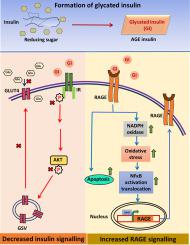Biochimica et Biophysica Acta (BBA) - Molecular Basis of Disease ( IF 4.2 ) Pub Date : 2020-11-25 , DOI: 10.1016/j.bbadis.2020.166029 Prachi B. Walke , Sneha B. Bansode , Nikita P. More , Arvindkumar H. Chaurasiya , Rakesh S. Joshi , Mahesh J. Kulkarni

|
Hyperglycemic condition in diabetes promotes glycation of various plasma proteins including insulin. Glycation of insulin has been reported to reduce its biological activity. Reduced biological activity of glycated insulin could be either due to reduced affinity for the insulin receptor and impaired insulin signaling, or it can act as a ligand for the receptor for advanced glycation end products (RAGE) and activates oxidative stress and pro-inflammatory pathways leading to insulin resistance. This study investigates the effect of glycated insulin on both insulin and RAGE signaling. Glycated insulin treatment to Chinese hamster ovary (CHO-IR-GLUT4) cells stably expressing insulin receptor (IR) and glucose transporter fused with a green fluorescent protein (GLUT4-GFP) resulted in the impairment of insulin signaling, as the phosphorylation of IR and AKT significantly reduced, which affected GLUT4 translocation and glucose uptake. Moreover, it also activated RAGE signaling as observed by increased expression of NADPH oxidase accompanied by an increase in reactive oxygen species (ROS). Immunofluorescence study indicated the translocation of NF-κB to the nucleus upon treatment of glycated insulin. This was associated with increased RAGE expression, Caspase 3, and cell death. Downregulation of RAGE with the losartan treatment restored the impaired insulin signaling and glucose uptake. Additionally, in silico study demonstrated that glycated insulin has reduced binding affinity to insulin receptor and increased binding affinity to RAGE. Overall, this study demonstrates the role of glycated insulin in exacerbating insulin resistance by impairing insulin signaling as well as stimulating AGE-RAGE signaling.











































 京公网安备 11010802027423号
京公网安备 11010802027423号